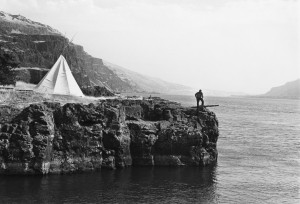Eastward I go only by force; but westward I go free… I must walk toward Oregon, and not toward Europe. And that way the nation is moving, and I may say that mankind progress from east to west.
– Henry David Thoreau
University of Oregon Libraries is pleased to announce an exhibit titled Framing the West: Photography in the Age of Manifest Destiny, Past and Present, now on display during the Fall 2018 term in the Special Collection and University Archives Paulson Reading Room.

Shawn Records, Duane Ehmer and his gelding, Hellboy, pose for journalists before the daily press conference at the Malheur National Wildlife Refuge. January 8, 2016 [Shawn Records photographs of the Occupation of the Malheur National Wildlife Refuge, PH365, Box 1; Special Collections and University Archives, University of Oregon Libraries, Eugene, Oregon]

Jacqueline Moreau, Chief Johnny Jackson stands at Lyle Point on the Columbia River. [Jacqueline Moreau papers, Coll 459, Box 10, Folder 4; Special Collections and University Archives, University of Oregon Libraries, Eugene, Oregon]
Because a photograph garners its meaning from the context in which it is seen, images could be readily used to advance the ideas and political agendas surrounding westward expansion, ranging from notions of manifest destiny to early conservation efforts. Ultimately, photography came to support the overarching narrative of American expansion as the inevitable “forward march of progress,” depicting supposed virgin land prime for development by Euro-Americans, and native peoples as a “vanishing race,” destined to be overcome by the impending American empire.

[Angelus Studio photographs, PH037, Special Collections and University Archives, University of Oregon Libraries, Eugene, Oregon]
Framing the West was curated by Danielle Mericle (Curator of Visual Materials) and Alexa Goff (Special Collections Intern). Exhibition production support by Mandi Garcia (Library Design and Exhibits Coordinator), Jason Stone (Strategic Communications and Writing Specialist), Ashlee Weitlauf (Conservator), and Randy Sullivan (Digital Production Manager). Original materials courtesy of Special Collections & University Archives, University of Oregon Libraries.

